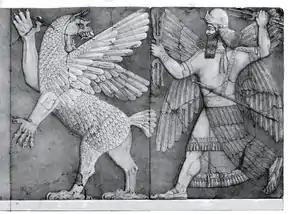Igigi
Igigi are the mythological figures of heaven in the mythology of Mesopotamia. Though sometimes synonymous with the term "Anunnaki", in one myth the Igigi were the younger beings who were servants of the Annunaki, until they rebelled and were replaced by the creation of humans.[1] They were half human half animals. The workers were semi intelligent, the others not.
| Part of a series on |
| Ancient Mesopotamian religion |
|---|
 Chaos Monster and Sun God |
|
|
Etymology
The name has unknown origin. It was originally spelt i-gi4-gi4, but was later also written as í-gì-gì. This latter may have been a play on words, as in Sumerian, the combination can be interpreted as numerals adding to 7 (the number of Great Gods), or multiplying to 600 (which in some traditions was the total number of gods).[2]
Atrahasis
Akkadian Paradise is described as a garden in the myth of Atrahasis where lower rank deities (the Igigi) are put to work digging a watercourse by the more senior deities (the Anunnaki).[3]
When the gods, man-like,
Bore the labour, carried the load,
The gods' load was great,
The toil grievous, the trouble excessive.
The great Anunnaku, the Seven,Were making the Igigu undertake the toil.[4]
The Igigi then rebel against the dictatorship of Enlil, setting fire to their tools and surrounding Enlil's great house by night. On hearing that toil on the irrigation channel is the reason for the disquiet, the Anunnaki council decide to create man to carry out agricultural labour.[4]
References
- Leick, Gwendolyn: A Dictionary of Ancient Near Eastern Mythology (New York: Routledge, 1998), p. 85
- "igigi in §4". Archived from the original on 2016-03-05. Retrieved 2016-03-05.
- William P. Brown (June 1999). The ethos of the cosmos: the genesis of moral imagination in the Bible. Wm. B. Eerdmans Publishing. pp. 140–. ISBN 978-0-8028-4539-9. Retrieved 17 June 2011.
- Millard, A. R., New Babylonian 'Genesis' Story, p. 8, The Tyndale Biblical Archaeology Lecture, 1966; Tyndale Bulletin 18, 3-18, 1967.